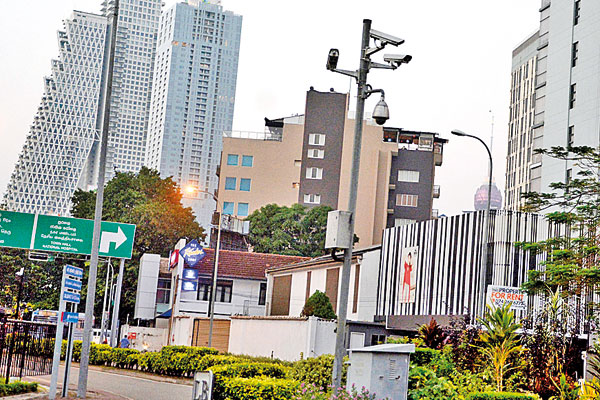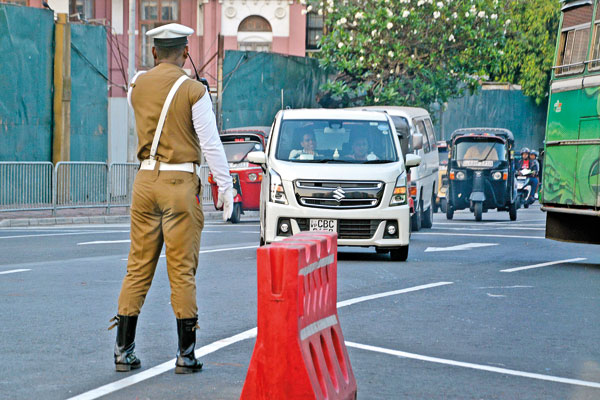News
Why road accidents keep occurring despite tough preventive measures
View(s):Experts cite driver indiscipline, behavioural issues and government failures as some of the key causes; call for holistic approach to address the problem
By Kasun Warakapitiya
Negligence, lack of discipline, wrong attitudes, and a lack of attention to identifying and rectifying key problems in the transport sector are paving the way for more traffic accidents, according to experts.
University professors, transport experts, traffic police, and state officials said that despite strict action, awareness, and other measures, accidents keep occurring.

We are watching you: At the Traffic Police CCTV monitoring unit officers keep a constant watch on selected areas of the city to detect traffic law violators.
Dr. Jayalath Edirisinghe, a senior lecturer at the Department of Civil Engineering, University of Peradeniya, explained that driver misbehaviour was a major factor that led to traffic accidents.
“Compared to countries where traffic accidents are less common, in Sri Lanka, obtaining a driving licence is relatively easy. So, there are doubts about standards and the quality of training. The authorities have no programmes on driver behaviour and attitude before giving a driving licence,” he said. (See the box story for the full interview.)
Traffic police officers also expressed similar views on the behaviour of drivers.
Deputy Inspector General (DIG) Indika Hapugoda, who is in charge of traffic control and road safety, also cited the reckless behaviour of drivers as one of the main causes of road accidents.
He said that despite police collecting tens of millions in road traffic fines annually, a high number of accidents still occur. For the first 11 months last year, traffic fines collected by police exceeded Rs. 1890 million.

cameras at work in the city. Pix by Indika Handuwala
“Most motorists have scant regard for disciplined behaviour; therefore, they repeat offences, fail to follow instructions, and endanger the lives of others as well as themselves. Until motorists’ attitudes change, traffic accident numbers cannot be reduced,” he said, calling for the early implementation of the proposed demerit system.
DIG Hapugoda said that under the demerit system, points are cut each time a driver commits an offence, and when the points cut reach a certain level, the driving licence of the offender will be cancelled.
He said that as part of the police attempt to minimise road accidents, they have launched a CCTV-based system to detect traffic violations.
More than two thousand deaths occurred due to fatal accidents from 2021 to 2023; most of the victims were pedestrians, followed by motorcyclists and passengers.
The police media spokesman, Deputy Inspector General Nihal Thalduwa, told the Sunday Times that despite strict action by the police and awareness programmes, motorists continued to commit traffic offences and ended up in accidents.
“The drivers’ attitudes are such that they repeat their mistakes; they lack discipline,” he said.
He added that the country’s education system should consider including road safety measures in the school curriculum to teach road discipline from a very young age.

The efficiency of law enforcement has a major impact on road safety, experts say
DIG Thalduwa said that often, people who commit traffic offences do not accept their mistakes. Instead, they try to bribe the traffic officer or use influence to avoid action taken against them, he said, acknowledging that some indisciplined police officers accept bribes.
The DIG said police would take strict action against officers who accept bribes, yet people also should have the self-discipline to accept that they have committed an offence and face the consequences.
He explained that when drivers frequently repeat offences, there is a high chance of facing accidents.
The task of reducing the number of accidents cannot be achieved through the efforts of authorities alone. It requires a holistic approach involving all stakeholders, including the Ministry of Transport, the Road Development Authority, the Ministry of Health, experts, traffic police, and others.
Prof. Samath Dharmaratne, the chairperson of the Sri Lanka Medical Association’s Expert Committee for Road Traffic Crash Prevention, explained that the country’s health sector bears a huge expense in saving lives and treating injuries of accident victims. He said a substantial saving in the health budget is possible if road accidents can be minimised.
He stressed the need for a high-level committee to address road safety, bridge the gaps between different authorities, and get every stakeholder involved in this endeavour.
In 2023, the Chief of Presidential Staff and President Ranil Wickremesinghe’s Senior Advisor on National Security, Sagala Ratanayake, announced that the president would appoint a high-level committee. However, this has still not happened, he said.
However, Amal S. Kumarage, Emeritus Professor of the Department of Transport Management and Logistics Engineering, University of Moratuwa, said the authorities have not yet properly addressed the causes of accidents.
Road designs and safety management processes should be upgraded to suit the increased number of vehicles, he said.
Prof. Kumarage said public transportation is the safest mode when compared to all other private vehicles, and therefore the government should improve the quality and capacity of public transport service so that people are not forced to use riskier modes of transport such as motorcycles and three-wheelers. He pointed out that statistics show bus passengers to be at a lower risk when compared to high-end cars.
“We have to improve roads, reduce the use of high-risk vehicles, improve the effectiveness of the traffic police, and even review the performance of the police in mitigating accidents. He said that one major drawback is that Sri Lanka does not hold state officials and politicians accountable for their failures, and, as a result, the country is continuing with unsafe roads.
The professor said traffic laws are adequate, yet there is a lack of investment in safety infrastructure, safety-based policies, and data-based road safety strategies.
The Commissioner General of Traffic, Nishantha Anuradha Weerasinghe, told the Sunday Times they hoped to implement the demerit system next year.
He said that they have obtained cabinet approval for this and amendments to the Motor Traffic Act to overcome legal issues.
| Rush to transfer open papers The use of CCTV cameras to detect traffic offences by the police has seen a surge in people visiting the Motor Traffic Department to transfer vehicle papers to their new owners. Commissioner General Nishantha Anuradha Weerasinghe acknowledged that motor traffic officials are busy transferring vehicle ownership to persons who purchased vehicles. He said most people preferred the open papers method when selling vehicles, but with the launch of the CCTV monitoring system, they are transferring the papers to those who have bought the vehicles because the person under whose name the vehicle is registered will have to pay the fines for a traffic offence detected by the CCTV system. He explained that according to the Motor Traffic Act, it is mandatory to inform the Commissioner General of Motor Traffic that the vehicle has been sold. And thereafter, the new vehicle owner should get the vehicle transferred to his name within 14 days. “If someone fails to get the vehicle ownership transferred, they would be fined Rs 100 per day. The fine would reach up to Rs 200,000 for cars and buses, while it would reach Rs 50,000 for three-wheelers and motorbikes.” | |
The best way to say that you found the home of your dreams is by finding it on Hitad.lk. We have listings for apartments for sale or rent in Sri Lanka, no matter what locale you're looking for! Whether you live in Colombo, Galle, Kandy, Matara, Jaffna and more - we've got them all!

